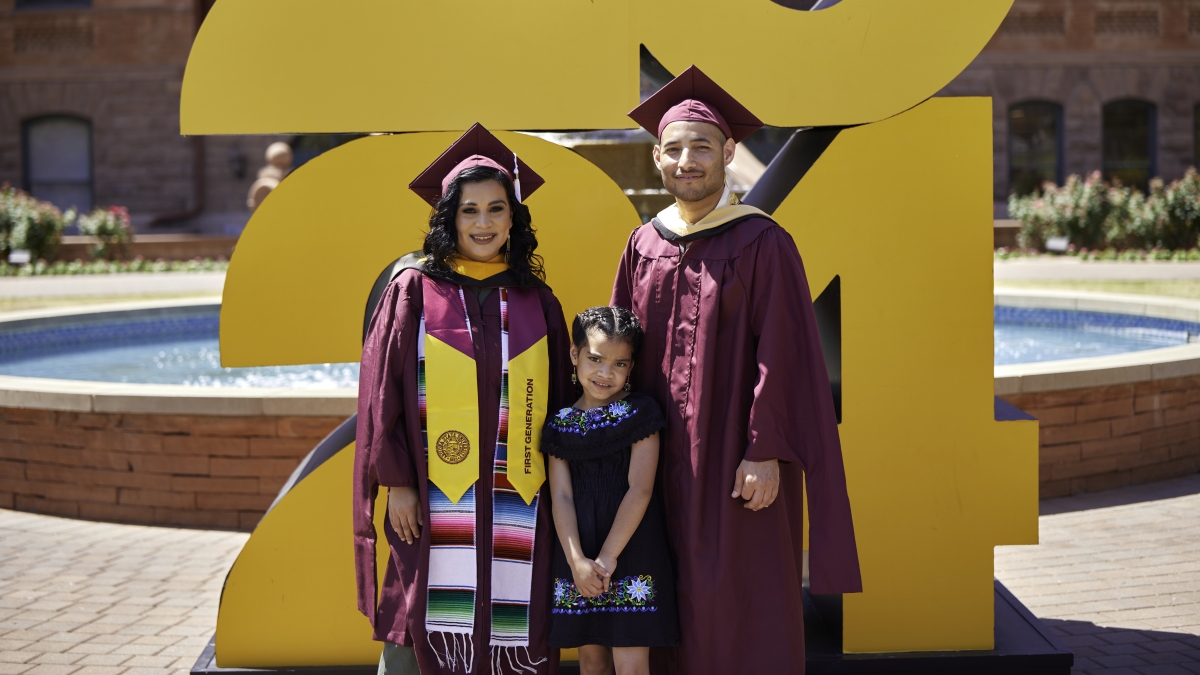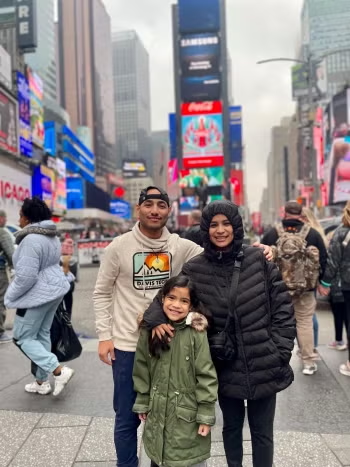Couple inspire generational achievement through education

Victor and Nataly Cruz don their maroon ASU caps and gowns with their daughter. Courtesy photo
On a sunny afternoon in Arizona, Victor Cruz and his wife Nataly Osorio-Cruz are commemorating their graduation like so many graduates do — with an Instagram reel. Arm in arm and in plain clothes, their daughter runs toward a camera and swipes her hand across the frame. Through the power of film editing, they share this important moment with the world, donning their maroon Arizona State University cap and gown.
The moment seems effortless, but the achievement is monumental. Victor and Nataly faced struggles many first-generation students go through and are experiencing life much differently than their parents did.
Victor grew up between the Dominican Republic and the United States, facing numerous obstacles, including an absent father and an undiagnosed learning delay.
And Nataly, born and raised in Los Angeles to immigrant parents from El Salvador and Mexico, was raised in a low-income Latino community. Growing up in LA, she was fiercely proud of her heritage and culture. It gave her the opportunity her parents didn’t have: the chance of earning her college degree.
It also provided an unexpected roadblock. Never having gone to college themselves, higher education wasn’t a goal Nataly’s parents ever talked about.
Latinos with advanced degrees accounted for 8% of all advanced degree holders in the U.S. in 2021, lower than the overall share of the U.S. population at 19%. Nevertheless, the number represents an emerging trend reflecting Latinos’ broader interest in postsecondary education attainment, especially as the number of Latinos with advanced degrees continues to rise (it has more than doubled since 2000).
That level of achievement sometimes requires perseverance against cultural and societal expectations. Students like Victor and Nataly, two first-generation college graduates from immigrant families, overcame numerous barriers to achieve milestones others told them were out of reach, including their own community.
They were able to earn their degrees, reach their professional goals and change the socioeconomic trajectory of their own family through ASU.
Today, Victor and Nataly hold graduate degrees. They are pioneers, shifting the narrative around higher education for their daughter, their extended family and their community.
They are among the 100,000 ASU Online graduates, a milestone ASU is celebrating this year.
With over 300 online degree programs, ASU Online meets students where they are and gives them a chance at degree completion they wouldn’t otherwise have.
The husband-and-wife duo are hoping that they can inspire their community to strive for similar educational achievements.
“As a little brown girl, it was expected more of me to get married and have a big family when the time came,” Nataly said. “I didn't grow up seeing Latina women pursuing higher education. I lacked a detailed understanding of what learning looked like beyond high school because no one in our family had gone to college before.”
When a teacher told his mother that he would amount to nothing, the words stung deeply and Victor questioned whether getting an education was worth it. But no matter how hard he worked, he couldn’t make ends meet. His lack of a degree was holding him back.
“I realized that without further education, I would continue to face financial hardship,” he said.
Desperate for a change and determined to prove doubting voices wrong, Victor enrolled in a technical college. One achievement motivated him to strive for another, and he eventually earned three associate degrees and two bachelor’s degrees. However, even with these accomplishments, he longed to make a more significant impact within his community.
“Reflecting on my own journey and the resilience it took to overcome adversity, I aspired to empower others facing similar challenges,” he said. “I’m driven by a deep-seated desire to support and uplift individuals like the young child I once was.”
Victor took a leap of faith and applied to ASU’s online social work program.
“Grappling with imposter syndrome, as a first-generation student, the moment I received acceptance into the program was profoundly emotional for me,” he said. “It symbolized breaking barriers and achieving a milestone not only for myself but for my family, as well.”
As a young adult, Nataly would find herself in Utah, a home that didn’t resemble her upbringing on the West Coast. She remembers there were no Latino professionals she could look up to.
Despite the absence of role models, she earned her associate and bachelor’s degrees through state colleges, and later, when her husband suggested applying to grad school with him, she jumped in with both feet.
As grad students together, Nataly and Victor shared their successes and failures, celebrated the excitement of research breakthroughs and supported each other through momentary setbacks. When school was hard, they reminded themselves of their core motivation: a better future for their daughter and a bigger impact on their community.
With ASU Online, Victor was able to leverage the asynchronous courses to accommodate his work schedule and parenting. The balancing act would not have been possible with an on-campus program, and it paid off.
“My ASU degree has been instrumental in both my personal and professional growth,” he said. “It equipped me to make a meaningful impact in the lives of others. It also deepened my commitment to serving others.”
Victor now works as a basic needs advisor and case manager. He provides vital support and assistance to students facing various challenges, ensuring they have access to essential resources and services.
As a family advocate case manager for her local school district, Nataly provides intervention services to at-risk students and their families. She advocates for and mentors students while promoting their success.
“My husband and I are redefining family goals as we hope to spark a desire for lifelong learning within our families,” Nataly said.
She credits her degree for the personal and professional development she’s experienced after graduating, none of which could have been possible without the flexibility of her online program.
“It has given me the opportunity to increase my earning potential, have advancement opportunities, provide a career change, and helps me stand out in the competitive job market,” she said.
She hopes that modeling these positive changes will help continue to shift the mindset around education in the community.
“We cannot advocate for our Latinx communities or make real change without knowledge and education,” she said. “I want to motivate a generational shift.”
More Sun Devil community

ASU president connects with veterans during town hall
Arizona State University President Michael Crow shared his family’s military background, provided university updates and reaffirmed ASU’s commitment to military-affiliated students during a town hall…

Tested tips for taking exams
With May quickly approaching, many students are starting to prep for their most important tests of the year — final exams.Toni Miceli, the inaugural director of the bar exam success program at…

School of Transborder Studies celebrates 15th anniversary
During the summer before his freshman year at Arizona State University, Salvador Macias participated in the AGUILA Youth Leadership Institute, a college access organization designed to help young…


